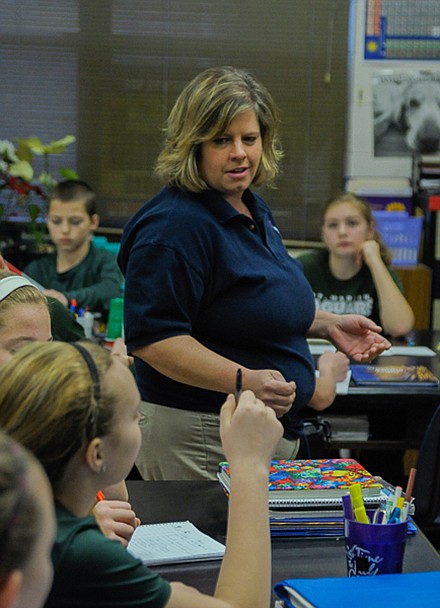ST. MARTINS, Mo. - The junior high science class of Melissa Rockers might appear more like a zoo, particularly for curious kindergartners peeking through the doorway.
A finch's squawk and the gurgle of fish tanks catch the ears as a bearded dragon or swimming turtle catch the eyes.
For the fifth- through eighth-grade students who learn each day in Rockers' classroom, these are normal, as are the inspirational posters featuring cute, wild animals or the mass of supplies for future lab experiments in the back of the room.
The seventh-graders put some of these tools to work during Catholic Schools Week, as they were studying light and reflection.
That's one of Rockers' main goals, to provide hands-on opportunities for students to learn about science.
Originally a high school agriculture teacher, Rockers returned to the classroom 13 years ago as a junior high science teacher at her home parish school after spending several years rearing her young family.
"I like it here; raising kids through puberty is a lot of fun," she said.
By teaching students for four years, Rockers said she enjoys being able to track their progress from struggling fifth- and sixth-graders to the light-bulb moments for seventh- and eighth-graders.
She is able to do that especially through her curriculum, which does not designate a specific science subject for each year but, rather, teaches a variety of science specialties for each class. She does not follow a textbook from front to back, either, which can be an adjustment for the fifth-graders, she said.
That flexibility allows Rockers to interrupt a study about the human body to brush up on electricity before a guest speaker visits to discuss the subject. Or, when NASA recently landed its probe on a comet, classes spent that day watching the activity in real time on the room's SmartBoard.
Touching on a variety of scientific disciplines prepares students for standardized testing, too, she said.
To continually keep her students engaged and challenged, Rockers must do the same for herself. She attends the National Science Teachers Conferences and incorporates the latest "next-generation" curriculum concepts.
"It's important to me to do the best I can," which follows the school's motto, Rockers said.
This year, Rockers also has found a way to further share her animal science background, while also extending scientific learning outside the school day, through 4-H.
More than 50 interested people turned out for the St. Martins 4-H Club organizational meeting in the fall. And with about 35 members, the club, which includes home-school and public school students too, already is one of the largest in Cole County.
Students may join traditional projects related to domestic animals and home life, but Rockers also made sure projects like robotics and aerospace were open, too.
Behind the school, three raised garden beds were established this summer through a Missouri Farm Bureau grant. Students were able to grow late fall crops like lettuce and radishes. And with fitted shelters, Rockers has plans for an early growing season this spring.
"There are so many things I teach here that I can apply there," Rockers said of the classroom to the outside activities.
Every two years, her students must prepare a science project for the classroom. Then, they show them off at a parish science fair after Mass on Feb. 20. Some may go on to the Diocese of Jefferson City science fair in March.
In alternating years, Rockers' students host a Science Day for the rest of the school. There, students can show off fun experiments like Mentos combined with soda or simulating a volcanic eruption.
Rockers' theory is all other academic subjects merge into the science classroom, where the primary benefit for life is problem-solving skills.
"Anything they do in life will revolve around science," Rockers said. "If they can't problem-solve, they'll have a hard time in life."

